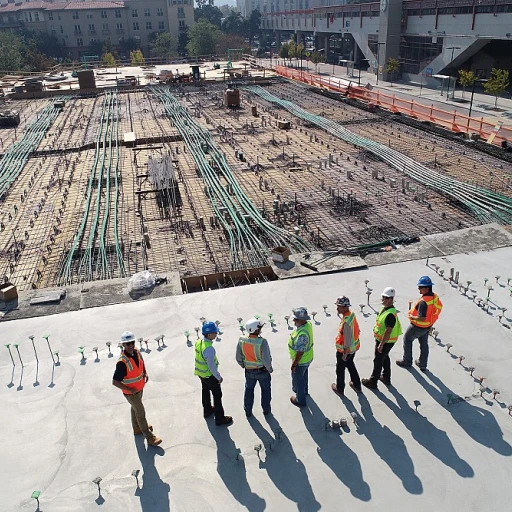
Understanding Real Estate Development Software
Understanding the Power of Development Software in Real Estate
Real estate development projects are intricate, involving numerous tasks, significant investment, and coordination among different team members. To successfully manage these projects, estate developers are increasingly relying on advanced software solutions that provide a comprehensive toolkit for managing every aspect of property development. Development software in real estate serves as a central hub for developers, streamlining project management by enabling real-time tracking of tasks, resources, and budgets. These solutions often incorporate features like document management, accounting software, and data analysis tools to assist in cash flow and financial management, leading to more informed decision making. A key advantage of utilizing property management software is its ability to handle vast quantities of data efficiently, as projects require continual updating of information, from construction plans to financial documents. Additionally, tools focused on resource allocation and task automation can significantly enhance productivity and cut down on project completion times, ultimately saving both time and financial resources. The integration of advanced development software ensures that all aspects of a project are connected, allowing for seamless coordination among different teams and stakeholders. To delve deeper into the features and benefits of such software solutions, you can explore more about open-source requirements management. As real estate continues to evolve, staying informed about the latest tools and technologies remains crucial for industry success.Key Features to Look for in Development Software
Essential Software Features for Real Estate Projects
Identifying the right development software can significantly boost the efficiency of real estate projects. When it comes to selecting real estate software, understanding the key features that align with your project needs is crucial. These features facilitate not only seamless project management but also enhance the overall development process.
- Project Management Tools: Essential for tracking tasks, timelines, and resource allocation. These tools help keep the development team aligned and focused on project milestones.
- Real-Time Data Access: Having access to real-time data allows estate developers to make timely and informed decision making. This is vital for adapting to changes and ensuring project success.
- Document Management: Simplifies the handling of various documents related to property and construction. Efficient document management contributes to smoother workflows.
- Financial Management Solutions: Integrating accounting software enables precise budget management and better oversight of cash flow throughout the estate development.
- Resource Allocation and Monitoring: Balancing resources is key to preventing bottlenecks in development projects. Software that monitors and optimizes resource utilization becomes a strategic advantage.
The integration of these features into development software plays a pivotal role in not only managing current demands but also setting a foundation for future advancements in real estate. For additional insights into enhancing project success rates, explore strategic management techniques that offer visual insights.
Benefits of Implementing Software in Real Estate Projects
Streamlining Processes and Enhancing Efficiency
The integration of advanced software solutions in real estate projects offers substantial benefits to the property development sector. By employing effective project management tools, estate developers can achieve more efficiency in handling complex tasks that accompany construction projects. Software real solutions automate routine processes, enhance communication, and provide real-time data accessibility, significantly boosting team productivity. In the realm of estate development, time is a critical factor. Developers who leverage technology to manage tasks can streamline their workflow, reducing project completion time. By enabling real-time monitoring and updates, management software allows for the proactive addressing of issues before they escalate, ensuring that timelines remain intact, and projects stay on budget. Financial management is another crucial component improved by implementing development software. With features like budgeting tools and accounting software, developers can maintain a clear picture of cost implications throughout the project's lifecycle. Automation in these areas minimizes errors and enhances cash flow management, empowering estate developers to make informed financial decisions. Moreover, document management capabilities ensure that all project-related documentation is stored securely and accessed effortlessly by authorized team members. This reduces manual paperwork and facilitates transparent communication across teams. Efficient resource allocation is also achievable with development software. By providing insights into team workloads and progress, project managers can balance resources effectively, maximizing output without overextending their team members. For organizations embracing these solutions, the challenges of property management, such as decision-making and execution of tasks, become significantly simplified. The implementation of advanced software in development projects stands not just as a trend but as a necessary evolution, enhancing the strategic execution of real estate projects and helping ensure successful outcomes. For further insights on incorporation of technology in modern workspaces, explore the power of wallscreens in workplace settings.Challenges in Adopting Real Estate Development Software
Overcoming Obstacles in the Adoption of Real Estate Development Software
In the realm of real estate projects, adopting advanced software for development and management can significantly streamline operations and enhance project outcomes. However, the path to fully integrating these tools is not without its hurdles. Acknowledging these challenges can better prepare estate developers and project managers in the integration process. Firstly, adapting to new technology presents a steep learning curve. Existing teams might be accustomed to traditional methods of managing tasks, tracking the development process, and handling document management. Shifting to project management software requires comprehensive training to ensure team members are fully equipped to use the new tools effectively. Budget constraints can also pose a challenge. While the financial benefits of using estate software can significantly outweigh the initial cost, stakeholders may be hesitant to allocate funds without a perceived immediate return on investment. Financial management and careful budget planning are essential when shifting to integrated solutions that involve development software. Moreover, data migration is pivotal when transitioning from traditional systems to advanced property management software. Ensuring accurate and complete data transfer, while maintaining the integrity of information, can be complex and time-consuming. Developers must prioritize a robust data strategy to manage data accurately and in real time. Resistance to change among team members may also arise. It's not uncommon for teams accustomed to legacy systems to express reluctance toward new software. Engaging all stakeholders effectively and illustrating the long-term benefits of efficient resource allocation and project management software can facilitate smoother transitions. Lastly, integrating accounting software with existing systems can often be fraught with compatibility and synchronization issues. The proper alignment of financial data with development software is critical to maintaining cash flow transparency and decision-making efficacy. By curbing these challenges through strategic planning and team engagement, real estate projects can capitalize on the transformative capabilities of development software, leading to a more efficient and seamlessly managed construction process.Case Studies: Successful Implementation of Development Software
Real-Life Success: Software Transforming the Real Estate Landscape
The realm of real estate development has witnessed notable success stories through the effective implementation of advanced software solutions. Developers and project managers have leveraged these tools to optimize various aspects of their projects, ranging from resource allocation to financial management.
One of the most significant impacts is seen in improved project management. By utilizing comprehensive estate software, teams can monitor development projects in real time, mitigating risks and managing unexpected challenges as they arise. This real-time monitoring facilitates better decision-making and keeps every team member and developer aligned with the project’s objectives.
In terms of financial management, incorporating accounting and cash flow management software has made a discernible difference. Real estate projects often involve complex spending and revenue patterns. Having robust accounting software enables project leaders to construct and stick to a realistic budget while adapting to any financial demands or constraints that may occur during the project lifecycle.
Team collaboration and efficiency have also improved with the adoption of collaborative tools and document management systems. Such features ensure that everyone involved in the development process, from construction teams to financial analysts, has access to up-to-date information and can perform their tasks efficiently.
Successful case studies illustrate that by using these comprehensive solutions, real estate developers can significantly reduce the time needed to transition a property from concept to completion, ultimately enhancing project outcomes and satisfaction among stakeholders.













